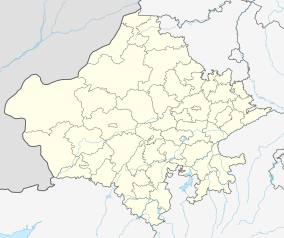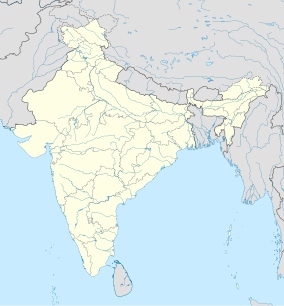| Mukundara Hills National Park | |
|---|---|
| IUCN category II (national park) | |
  | |
| Location | Rajasthan, India |
| Nearest city | Kota |
| Coordinates | 24°52′05″N 75°51′22″E / 24.868°N 75.856°E / 24.868; 75.856 |
| Area | 759.99 km (293.43 sq mi) |
| Established | 2004 |
Mukundara Hills National Park is a national park in Rajasthan, India with an area of 759.99 km (293.43 sq mi). It was established in 2004 and consists of three wildlife sanctuaries: Darrah Wildlife Sanctuary, National Chambal Sanctuary, and Jawahar Sagar Wildlife Sanctuary. It is located in the Khathiar-Gir dry deciduous forests.
History
The national park contains large tracts of forests formerly part of the Maharaja of Kota's hunting grounds. The park was embroiled in a political controversy over its nomenclature, when the Bharatiya Janata Party state government revoked the decision that it be called the Rajiv Gandhi National Park.
Wildlife
| This section does not cite any sources. Please help improve this section by adding citations to reliable sources. Unsourced material may be challenged and removed. (September 2020) (Learn how and when to remove this message) |
Mukundara Hills National Park is mountainous and has a variety of plants, trees and animals. It has grasslands in between and also many dry deciduous trees. There are four rivers that flow in this region, the rivers are Chambal river, Kali river, Ahu river, Ramzan river.
Tree species in the forests of Mukundara Hills National Park include Acacia nilotica, Atrocarpus heterophyllus, Aegle marmelos, Azadirachta indica, Bombax ceiba, Breonia (syn. Anthocephalus), Cassia fistula, Citrus aurantifolia, Delonix regia, Dalbergia sissoo, Phyllanthus emblica, Eucalyptus, Ficus religiosa, Ficus glomerata, Ficus benghalensis.
Bengal tiger, the Indian wolf and the Indian leopard are the major carnivores in this reserve. Prey species include the chital, sambar deer, wild boar and the nilgai. Sloth bear and chinkara also inhabit the area. Reptiles include the Mugger crocodile and the gharial.
See also
- Arid Forest Research Institute (AFRI)
- Indian Council of Forestry Research and Education
- Jawahar Sagar Dam
- Wildlife of India
References
- World Database on Protected Areas (2019). "Darrah in India". Protected Planet United Nations Environment World Conservation Monitoring Centre.
- "Khathiar-Gir Dry Deciduous Forests". Terrestrial Ecoregions. World Wildlife Fund. Retrieved 13 February 2017.
- "Mukundara Hills is Rajasthan's third tiger reserve". Envis Centre, Ministry of Environment & Forest, Govt. of India. 2013. Archived from the original on 14 May 2020.